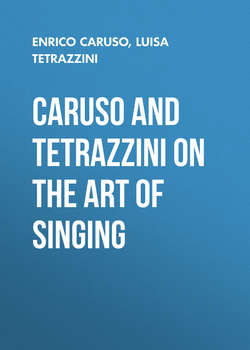Читать книгу Caruso and Tetrazzini on the Art of Singing - Enrico Caruso - Страница 2
LUISA TETRAZZINI
Introductory Sketch of the Career of the World-Famous Prima Donna
ОглавлениеLuisa Tetrazzini, the most famous Italian coloratura soprano of the day, declares that she began to sing before she learned to talk. Her parents were not musical, but her elder sister, now the wife of the eminent conductor Cleofante Campanini, was a public singer of established reputation, and her success roused her young sister's ambition to become a great artist. Her parents were well to do, her father having a large army furnishing store in Florence, and they did not encourage her in her determination to become a prima donna. One prima donna, said her father, was enough for any family.
Luisa did not agree with him. If one prima donna is good, she argued, why would not two be better? So she never desisted from her importunity until she was permitted to become a pupil of Professor Coccherani, vocal instructor at the Lycée. At this time she had committed to memory more than a dozen grand opera rôles, and at the end of six months the professor confessed that he could do nothing more for her voice; that she was ready for a career.
She made her bow to the Florentine opera going public, one of the most critical in Italy, as Inez, in Meyerbeer's "L'Africaine," and her success was so pronounced that she was engaged at a salary of $100 a month, a phenomenal beginning for a young singer. Queen Margherita was present on the occasion and complimented her highly and prophesied for her a great career. She asked the trembling débutante how old she was, and in the embarrassment of the moment Luisa made herself six years older than she really was. This is one noteworthy instance in which a public singer failed to discount her age.
Fame came speedily, but for a long time it was confined to Europe and Latin America. She sang seven seasons in St. Petersburg, three in Mexico, two in Madrid, four in Buenos Aires, and even on the Pacific coast of America before she appeared in New York. She had sung Lucia more than 200 times before her first appearance at Covent Garden, and the twenty curtain calls she received on that occasion came as the greatest surprise of her career. She had begun to believe that she could never be appreciated by English-speaking audiences and the ovation almost overcame her.
It was by the merest chance that Mme. Tetrazzini ever came to the Manhattan Opera House in New York. The diva's own account of her engagement is as follows:
"I was in London, and for a wonder I had a week, a wet week, on my hands. You know people will do anything in a wet week in London.
"There were contracts from all over the Continent and South America pending. There was much discussion naturally in regard to settlements and arrangements of one kind and another.
"Suddenly, just like that"—she makes a butterfly gesture—"M. Hammerstein came, and just like that"—a duplicate gesture—"I made up my mind that I would come here. If his offer to me had been seven days later I should not have signed, and if I had not I should undoubtedly never have come, for a contract that I might have signed to go elsewhere would probably have been for a number of years."
Voice experts confess that they are not able to solve the mystery of Mme. Tetrazzini's wonderful management of her breathing.
"It is perfectly natural," she says. "I breathe low down in the diaphragm, not, as some do, high up in the upper part of the chest. I always hold some breath in reserve for the crescendos, employing only what is absolutely necessary, and I renew the breath wherever it is easiest.
"In breathing I find, as in other matters pertaining to singing, that as one goes on and practices, no matter how long one may have been singing, there are constantly new surprises awaiting one. You may have been accustomed for years to take a note in a certain way, and after a long while you discover that, while it is a very good way, there is a better."
